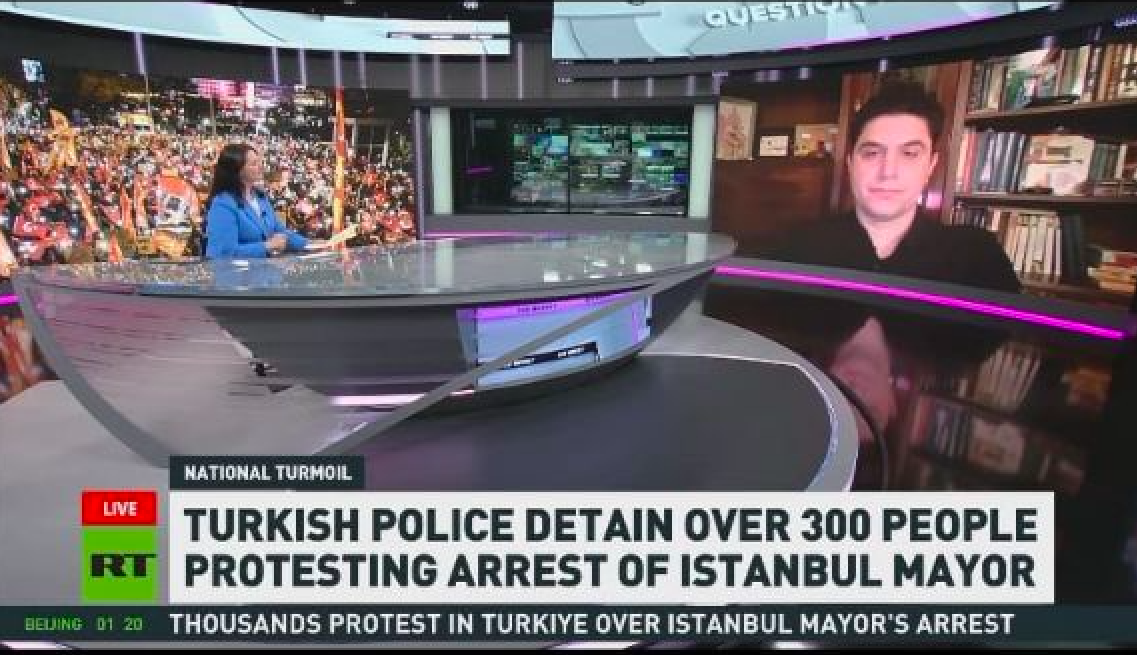Economic factors and social injustice are important factors behind the protests.
Economic factors and social injustice are important factors behind the protests.
UWI author, political scientist Onur Sinan Güzaltan was guest to Russia Today’s live broadcast. Güzaltan answered the questions on ongoing demonstrations in Türkiye.
Our correspondents say that this is a potentially significant movement in Turkish history. We have seen a large participation of the citizens. I wonder how significant you think this is in terms of polarization within the country, and whether this is over Imamoğlu’s arrest or this is a wider struggle, because people have been talking about issues with the economy, inflation, health care, education system in Türkiye for many years.
First of all, the discussion over Imamoğlu has two sides. One is the legal side, and the other is the political. Since the case is still ongoing, I cannot comment on the legal side. As for the political side, as you mentioned after Imamoğlu’s arrest people, mostly young and university students, took to the streets in many cities and showed their reaction.
This reaction is not just for supporting Imamoğlu, it is more than that. It is a reaction to the policies that the government has been pursuing for over 20 years and especially last 2 years as the economic situation is not going well. Another important aspect of the protests is the social injustice along with the economic situation. These young people are carrying the Turkish flag and the posters of Mustafa Kemal Atatürk. That shows that they are the patriotic and leftist section of the society. They don’t only consist of the supporters of Imamoğlu.
As for the polarization in Türkiye, sure in the last 5 years it increased in the Turkish society. But I don’t think that the two parties, AKP and CHP, will come to confront each other in the street. After all Türkiye is a country of a strong statehood tradition and national unity sentiment.
Not a stand-off between the West and the East
You spoke about that on social media recently. You said the ongoing conflict in Turkish politics is not part of a stand-off between the West and the East, but rather a result of contradiction within the West itself. Could you elaborate on what you mean by that?
I mean that both sides in this confrontation, President Erdoğan and Imamoğlu or the opposition in general, want to keep Türkiye in the Atlantic world. Erdoğan was pursuing the “policy of balance”, but after the election of Trump, he is now trying to reestablish the frayed ties with the US. Also, he says that Türkiye’s aim is to enter the European Union. So, it is not wrong to say that Erdoğan is giving the West upper hand in this “policy of balance”. And Imamoğlu, from the beginning of his political career, has been endorsing “good relations” with the West, NATO, European Union and the US. That’s why I said that the ongoing conflict in Turkish politics is not part of a stand-off between the West and the East. It is rather a confrontation between Western-oriented fractions. After the election of Trump, the political situation in the Atlantic is rapidly changing, as we see in the relations between the EU and the US. It should not be forgotten that the main dynamics of these protests are internal issues like economic crisis and social injustice.
Why is the EU silent?
You mentioned the EU. What I think is quite interesting is that we haven’t had much of a reaction from Brussels regarding the protests in Türkiye. That’s very significantly different to how we’ve seen the EU reacting to similar demonstrations in Romania and Belarus in the last few years. Why do you think the EU is staying quiet on this?
With the election of Trump, the US started to move away from the EU. Now there is a big conflict between Washington and Brussels. The European side, in line with the former US president Biden, want to continue their aggressive polities against Russia. They need new partners to continue this policy. I think that explains the silence of the EU regarding the demonstrations in Türkiye. The EU changed its policy towards Türkiye to gain it to their side especially in terms of security issues.
















Leave a Reply